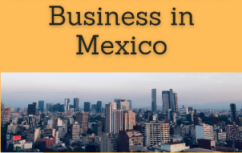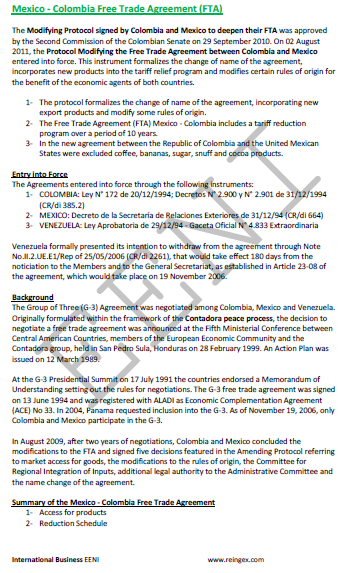Mexico-Colombia Free Trade Agreement

Foreign Trade Mexico-Colombia (FTA Agreement) coffee, sugar
- Introduction to the Free Trade Agreement between Mexico and Colombia
- Protocol amending the Agreement Colombia-Mexico
- Advantages of the Agreement
- Foreign Trade between Mexico and Colombia

The Subject “Mexico-Colombia Free Trade Agreement” belongs to the following Online Programs taught by EENI Global Business School:
Doctorate: Global Trade.
Masters: International Business, Foreign Trade.
Mexican Economy, Carlos Slim, Competitive Advantages, Jalisco, Nuevo Leon, Chihuahua...
Languages: 
 México Colombia
México Colombia  Mexique
Mexique  Mexico.
Mexico.

In 2011, the protocol modifying the Free Trade Agreement between Mexico and Colombia entered into force.
Sample - Mexico-Colombia Free Trade Agreement (FTA)

- This Protocol formalizes the change of name of the agreement, incorporating new export products and modify some rules of origin
- The Free Trade Agreement (FTA) Mexico-Colombia includes a tariff reduction programme over a period of ten years
- In the new agreement between Colombia and Mexico were excluded coffee, bananas, sugar, snuff, and cocoa products
- The Group of 3 (G-3) Agreement was negotiated among Colombia, Mexico, and Venezuela. Initially, formulated within the framework of the Contadora peace process in 1999

Summary of the Mexico-Colombia Free Trade Agreement.
- Access for products
- Reduction Schedule
- Automotive Sector
- Plant and animal health measures
- Rules and Certificate of Origin
- Customs Procedures
- Safeguards
- Unfair trade
- International Trade in Services
- Telecommunications
- Financial Services
- Temporary entry for business persons
- Procurement
- State companies
- FDI
- IPR
- Dispute settlement
- Administration of the Agreement
- Transparency
- Exceptions
The Free Trade Agreement between Mexico and Colombia operates in the Latin American Economic Area.
(c) EENI Global Business School (1995-2024)
We do not use cookies
Top of this page



